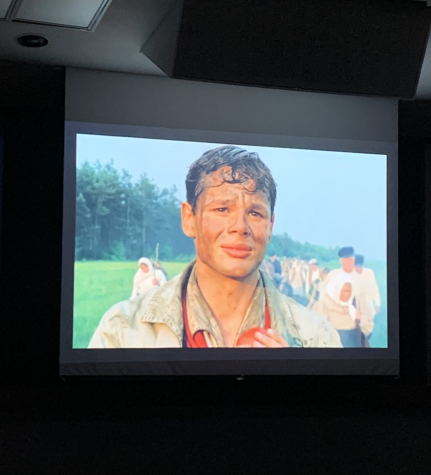‘Europa Europa’: A coming of age story amidst war and identity struggle

On April 27, Tom Prasch, professor and chair of history, organized a screening of “Europa Europa,” a film based on the memoir of the late Solomon Perel, who passed away Feb. 2 of this year. The 1990 historical war drama was directed by Agnieszka Holland and tells of the real-life events of a young boy, Solomon during World War II who impersonated a German and entered the Hitler Youth camp to avoid getting captured by the Nazis.
The film begins with Perel’s own narration, starting from his birth and circumcision and the time skips to his adolescence in the late 1930s where Perel is living with his family in Germany. He and his family are forced to flee and go into hiding, and Perel is finally separated from his family with his older brother and left to fend for himself. It’s a heartbreaking portrayal of the impact of war and persecution on individual lives.
Perel is left on his own and, after a series of harrowing experiences, is taken in by a group of German soldiers who mistake him for a pure-blooded German. Perel decides to disguise himself as a German and joins the Hitler Youth camp after being mistaken as a pure-blooded German. The film effectively captures the irony of life as it mocks Perel as he switches identities and eventually comes to accept himself.
As Perel struggles to reconcile his Jewish heritage with his adopted German identity, the film is a powerful exploration of the identity crisis. The movie also depicts the atrocities of the Holocaust, as Solomon witnesses the horrors of the war firsthand. His struggle to deny his own identity and create a new one is displayed by excellent cinematography and portrays the coming of age story.
“This movie is the sign of identity as coming of age is all about coming into some identity. That is clear from the beginning of the film when Perel recalls his circumcision and the next one of being naked and escaping from the Germans by posing as their kind,” Prasch said.
This movie is a complicated story with some humor about the Holocaust and the impact of war on individuals and their sense of identity to survive in the situation. Whenever Perel tried being honest with someone about his identity, an irony was presented upon himself that led him to be an imposter.
Daniel Brachman, a history audit program student at Washburn, shared his opinions on the movie and how he liked the part where Perel was forced to encounter his true self.
“The fact that Perel had been reinforced with an actor–who tells him that it is easier to be someone else other than our own selves–immediately teaches him that he must conceal his identity if he’s to survive,” Brachman said.
In the end, Perel was able to be completely honest with his brother when they reunited in a concentration camp. His brother, like the viewers, believed in his ironic life but told him not to share it with anyone, for nobody would find it believable.
Overall, the movie is a powerful representation of one’s sense of identity and how one’s identity changes depending on the circumstances, yet they cannot reject who they are.
“The movie ‘Europa Europa’ is about Europe at the end of the World War. It is a broken thing in which nations and states have dissolved as the result of war,” Prasch said.
Prasch also announced that another historical movie night will take place the following week with the screening of “History of the World part 2” in Henderson 112.
Edited by Simran Shrestha and Glorianna Noland
Your donation will support the student journalists of Washburn University. Your contribution will allow us to purchase equipment and cover our annual website hosting costs.







